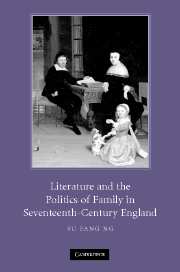Book contents
- Frontmatter
- Contents
- Acknowledgments
- Introduction: strange bedfellows – patriarchalism and revolutionary thought
- PART I REVOLUTIONARY DEBATES
- PART II RESTORATION IMAGININGS
- Interchapter: revolutionary legacies
- 5 Execrable sons and second Adams: family politics in Paradise Lost
- 6 Marriage and monarchy: Margaret Cavendish's Blazing World and the fictions of queenly rule
- 7 Marriage and discipline in early Quakerism
- Epilogue: the family-state analogy's eighteenth-century afterlife
- Index
5 - Execrable sons and second Adams: family politics in Paradise Lost
Published online by Cambridge University Press: 22 September 2009
- Frontmatter
- Contents
- Acknowledgments
- Introduction: strange bedfellows – patriarchalism and revolutionary thought
- PART I REVOLUTIONARY DEBATES
- PART II RESTORATION IMAGININGS
- Interchapter: revolutionary legacies
- 5 Execrable sons and second Adams: family politics in Paradise Lost
- 6 Marriage and monarchy: Margaret Cavendish's Blazing World and the fictions of queenly rule
- 7 Marriage and discipline in early Quakerism
- Epilogue: the family-state analogy's eighteenth-century afterlife
- Index
Summary
GENESIS, PARADISE LOST, AND PATRIARCHAL THEORIES OF THE STATE
In the first invocation of Paradise Lost, the narrator asks his Heavenly muse what caused the fall, what “Mov'd our Grand Parents in that happy State, / Favour'd of Heav'n so highly, to fall off / From thir Creator” (1.29–31). The language of “Grand Parents” and “happy State” is reminiscent of patriarchal political theory. Beyond the familial language, the epic poem also reexamines the original social compact. In its reworking of family metaphors in the context of Genesis, Paradise Lost can be compared to a number of major works of political philosophy in the period. Given that the story of the fall is an aetiology of human society, Genesis was remarkably resonant for family-based politics in the seventeenth century. Mary Ann Radzinowicz suggests that the Genesis story can be contrasted with the myth of Utopia, another garden state: “in Milton's day utopia seldom was, whereas the Genesis myth not only could be but repeatedly was, made to argue social and political reform.” But these two myths tend to inhabit different genres of writing. Even when not arguing directly for reform, utopias are often political theory in the form of fiction, while arguments for political reform using Genesis tend to be biblical exegesis. Milton combines utopia with Genesis to address fundamental questions of political obligation.
- Type
- Chapter
- Information
- Publisher: Cambridge University PressPrint publication year: 2007



